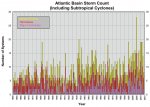- Joined
- Jul 19, 2012
- Messages
- 14,185
- Reaction score
- 8,768
- Location
- Houston
- Gender
- Male
- Political Leaning
- Libertarian
On August 15 the Geophysical Fluid Dynamics Lab at the National Oceanographic and Atmospheric Administration (NOAA) issued a summary report, “Global Warming and Hurricanes: An Overview of Current Research Results”.
In short, they found no significant upward trend in storm numbers or severity from 1887 to 2006.
This doesn't keep them from using computer models to predict that storms will increase in the future.
Major hurricanes happen when they happen. The storm of 1900 that wiped out Galveston Island with the loss of thousands of lives, Hurricane Carla, a category 4 storm with winds up to 170 mph prompted the largest peacetime evacuation in history in 1961 close to the same area. There is a chance that such storms will occur in any given year. So far the probability of that happening has not increased despite assurances that we are in the grips of anthropogenic global warming.
Get Ready for a Hurricane of Nonsense | Power Line
In short, they found no significant upward trend in storm numbers or severity from 1887 to 2006.
We find that, after adjusting for such an estimated number of missing storms, there remains just a small nominally positive upward trend in tropical storm occurrence from 1878-2006. Statistical tests indicate that this trend is not significantly distinguishable from zero [bold emphasis in original].
“The evidence for an upward trend is even weaker if we look at U.S. landfalling hurricanes, which even show a slight negative trend beginning from 1900 or from the late 1800s. . . In short, the historical Atlantic hurricane frequency record does not provide compelling evidence for a substantial greenhouse warming-induced long-term increase” [again, bold emphasis in original].
This doesn't keep them from using computer models to predict that storms will increase in the future.
Major hurricanes happen when they happen. The storm of 1900 that wiped out Galveston Island with the loss of thousands of lives, Hurricane Carla, a category 4 storm with winds up to 170 mph prompted the largest peacetime evacuation in history in 1961 close to the same area. There is a chance that such storms will occur in any given year. So far the probability of that happening has not increased despite assurances that we are in the grips of anthropogenic global warming.
Get Ready for a Hurricane of Nonsense | Power Line






